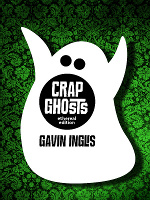Blog
London Shows
25th October 2011
Live in the Big Smoke.I often wish that my Edinburgh flat had a door which led to London. I suppose it might lead to complications with the Council Tax, but I would like to be able to drop into the city’s cultural schedule at will without that messy business of travel and accommodation.
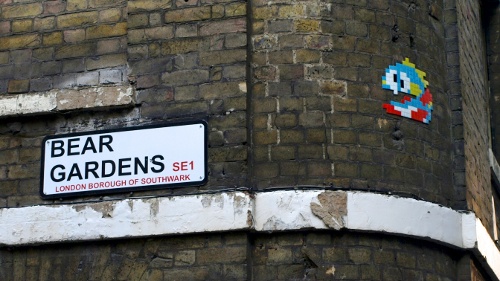
I used to live in a plasterboard half-room in Clapham and work in London Bridge, so I’m comfortable getting around the city and seeking out whatever my specialist interest is at the time, whether it’s Egyptology at the Petrie Museum, typography at St. Bride’s or the declining population of pinball machines, of which London is a rich source. (Know any?) I visit once or twice a year on average.
One thing I’ve never properly engaged with is London’s lit scene. I hope to start fixing that next week with a couple of reading slots.
First up on Tuesday 1st November is The Special Relationship at Concrete @ Pizza East, downstairs at 56 Shoreditch High Street. I’ve yet to meet the YARN crew in person but I’ve seen Jarred McGinnis and Sam Taradash read before and they are dead-eye pros. The night seems to lean towards material that crosses art forms, so I will take down some of my music-backed stories from Bloc’s festival offering, Electric Lit Orchestra. 7.30pm start here.
Then on Wednesday 2nd November I’m cruising over to Clerkenwell for the Four Thirty Three magazine live event at the Betsey Trotwood. 4'33" is an audio publication with values close to my heart — keep it tight, hit hard with it — and the Betsey seems to have a staggering regular programme of music and words. It’s at 56 Farringdon Road, 7.30pm.
Can’t wait; hope my delicate Glasgow phrasing will play well to London ears.
Words and Music
29th August 2011
Soaking up new directions for future work.I am jealous of musicians. There. I said it.
As a writer you spend hours staring at blank pages, trying to manipulate your unconscious to come up with something startling and insightful which will touch people on a deep level. Then you crank out the first draft against psychological resistance. Then you hate it. Eventually you go back to it and start rewriting and revising. Finally you agonise over the placement of paragraph breaks and commas. Weeks later you take it to a spoken word event and pour it out and if you got everything else just right, a few people are moved by it.
Compare that to musicians. They get together and work out a few chords, get into a groove and people respond intuitively to the music. We are programmed to change mood depending on the music we hear. If you don’t believe me, try watching a scary film without the soundtrack — or notice how often the hard rock riff kicks in as the action hero finally takes his stand.
Don’t get me wrong; I know how hard it is to become a skilled musician. I play more instruments than you might think — and none of them particularly well. I’m just saying, the pluckers and honkers and plonkers have a natural advantage.
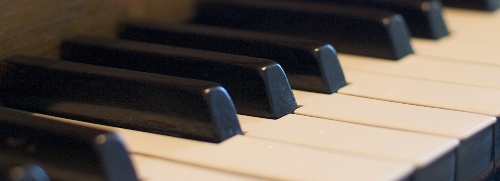
One of the approaches to having a good Edinburgh Festival is to explore a theme. My season this year was coloured by two themes: magic and storytelling — of which another time — and music and storytelling. Even the terrific Devil In The Deck, which incorporated card magic into a story of dire predictions and fateful life choices, had a bloke sitting at the back cranking out fat guitar licks.
Two of the Chemical Poets were working the music in underground chambers. Texture presented a farewell to cyberpunk at the Royal Oak (I wrote “Royal Punk” first time, that would be a good bar) reading to his own music. He used a great little pedal to give some characters a Davros/Transformers voice. The Oak is a folky bar; the music and voice-changer were just what the show needed to lift the audience out of there and into the glittering data fields.
Harlequinade is a guy with a unique artistic vision, and I think it’s fair to say he was doing the only Lovecraftian clown/bouffon rap apocalypse show at the Fringe this year. His Church Of When The Shit Hits The Fan partner Asthmatic Astronaut supplied a lingering soundtrack. We were sitting in an arched cellar of the Banshee Labyrinth and the atmosphere was at its best when the story, and sound effects, sank beneath the waves on a journey to cosmic oblivion in brine.
Of course the main reason I have been thinking about this stuff was our Writers’ Bloc show at the Book Festival. Named Electric Lit Orchestra, I programmed only stories with a musical accompaniment — two of which were enjoyably dodgy: a one-man band and cross-gender karaoke. We brought in punk guitarists, a saxophonist, a cellist and even a small choir. And I can tell you, no matter how good your story is, people still wake up when the music starts.
Havers and Blethers
21st July 2011
New spoken word by Captain’s orders.Festival time in Edinburgh can be strange for the writer who performs their own work. You walk around a city choked with shows, operating from every conceivable venue, and many, many of them are absolutely dire. Yet unless you got organised six months earlier and paid the almighty price of entry to the Fringe programme, you probably won’t get a gig.
There are exceptions — Itsy’s Kabarett events have some slots if you can handle the intimidation factor of appearing between edgy comedians and beautiful women taking their clothes off. And PBH’s Free Fringe has an entire spoken word programme at the Banshee Labyrinth which you might be able to squeeze into somewhere. But on the whole, you’re more likely to be bumped from your regular haunt by a out-of-town trio singing topical comedy songs, losing money on every show.

Which is why it was refreshing last year to see the arrival of Havers and Blethers. This presented twenty different nights of unpretentious spoken word — powerful stories and poetry delivered by locals and guests, with a little music to taste. It’s back this year in a prime slot, 7.30pm–8.30pm; a central location, the Captain’s Bar on South College Street; and at the time of writing, it still has slots available.
Of course we’re talking here about reading to an open pub, not a sanitised back room populated only by poets waiting for their own slot. But it’s a pub packed with people who appreciate a good poem or a story, and will shut up for long enough to give you a chance. It has an occasional pirate theme, perfect for stories of buried treasure, exotic islands or sea monsters. And it’s beneath the room where William McGonagall died.
If you think you have something that fits the bill — five to eight minutes is about right — then drop the bar a line. Or pop in and ask for Captain Pamela. Yarrrr.
Havers and Blethers, Captain’s Bar, South College Street. 7.30pm–8.30pm, 1st–20th August. FREE admission.
Edinburgh Spoken Word
26th May 2011
Words so new, the ink hasn’t dried.Spoken word nights come and go. The earliest one I remember was Rodney Relax’s Yellow Café in what is now Medina. Being a producer and avid consumer of stories, I’ve never been very interested in exclusive poetry nights like Big Word or Is This Poetry? and somehow I've never become a regular at the Forest’s lit/music/poetry institution The Golden Hour. Recently, though, we’ve seen three new nights around the capital. They’re all different, they’re all great, and all of them are on nights you might otherwise spend watching dregs on TV. Get out and try them.
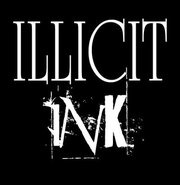 First up, on a occasional Sunday night, comes Illicit Ink. Cunningly
situated in the Speakeasy, a lush hideaway on Blair Street, this is the
brainchild of Napier creative writing students who have descended from
their ivory tower wearing big stompy boots. No open mic here — the
evening is themed (anti-Valentine, faeries, murder) and they try to
introduce some little extra to every show, whether it be winged MCs or
actual interrogations. An intimate event to make the weekend last longer.
First up, on a occasional Sunday night, comes Illicit Ink. Cunningly
situated in the Speakeasy, a lush hideaway on Blair Street, this is the
brainchild of Napier creative writing students who have descended from
their ivory tower wearing big stompy boots. No open mic here — the
evening is themed (anti-Valentine, faeries, murder) and they try to
introduce some little extra to every show, whether it be winged MCs or
actual interrogations. An intimate event to make the weekend last longer.
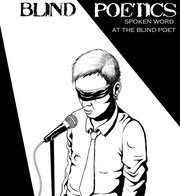 Winning the prize for easiest venue to remember is Blind
Poetics at The Blind Poet. This night takes over the entire pub on
the second Monday of the month. Run by Weaponizer supremo Texture, who
has one foot in the world of prose and one in the world of poetry (as
well as a weird third foot in the world of music) it’s
already made a name for carefully chosen programming and a buzzing
atmosphere. Get there early to secure a sofa.
Winning the prize for easiest venue to remember is Blind
Poetics at The Blind Poet. This night takes over the entire pub on
the second Monday of the month. Run by Weaponizer supremo Texture, who
has one foot in the world of prose and one in the world of poetry (as
well as a weird third foot in the world of music) it’s
already made a name for carefully chosen programming and a buzzing
atmosphere. Get there early to secure a sofa.
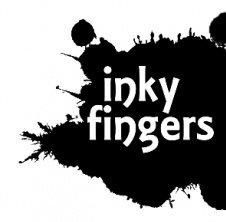 Finally, Inky Fingers
is the most established “new” night. Run by a colourful collective, headed by
the energetic figure of Harry
Giles, Inky Fingers normally drops in to the Forest Café on
the last Tuesday of the month. Unusually, they open up with a solid feature
performer and only then switch to their open mic. Here, you’ll get a
real roll of the dice: I've heard several startling pieces of literature which
came out of nowhere and demanded more than their allotted time,
and seen a performance which was as close to a lethal car crash as you can
achieve with five minutes and a single microphone.
Finally, Inky Fingers
is the most established “new” night. Run by a colourful collective, headed by
the energetic figure of Harry
Giles, Inky Fingers normally drops in to the Forest Café on
the last Tuesday of the month. Unusually, they open up with a solid feature
performer and only then switch to their open mic. Here, you’ll get a
real roll of the dice: I've heard several startling pieces of literature which
came out of nowhere and demanded more than their allotted time,
and seen a performance which was as close to a lethal car crash as you can
achieve with five minutes and a single microphone.
Inky are serious about this stuff. They’re organising their own small festival for August 8th–13th. Six days of spoken word, and perhaps the last chance to appear in the embattled Forest Café. You have until June 10th to propose something …
Standup
16th March 2011
Ten minutes where I learn whether I am funny.So I had a secret plan to try stand-up comedy in 2011. I feel comfortable MCing and lots of my stories are funny, so I thought it would be a natural progression. I thought I'd book into a beginners’ night and while I was waiting for my name to come up — these things have an eight-month queue — I would embark on a period of intense study to try, somehow, to assemble five minutes of usable material. That was before Siân Bevan offered me a ten-minute slot at her comedy storytelling night Electric Tales with two weeks notice.
I could have easily done a couple of stories from Crap Ghosts but there is a “no reading” rule. So it came down to memorising stories — which I should do anyway — or trying something new.
I’ve learned flash fiction word-for-word before, for a “prose slam”. I found I could do it but my performance lacked energy. I was so busy concentrating on getting the words right that I wasn’t throwing myself into it like I usually would. So I put the substandard spooks away for the night and worked up some material on The Six Million Dollar Man.
![[Bionic Punch]](http://farm6.static.flickr.com/5060/5531631532_7719f15aa7.jpg)
Nobody is quite sure what to make of Electric Tales. The storytellers like Gerry Durkin select their funnier stories. The comedians like Andrew Learmonth discard some nob gags and make room for something with more narrative. Coming at it from the storytelling angle is easier because it’s driven by a series of images: you talk about the bionic legs, then arms, then eye, then ear. You don’t need to remember the exact words. I practised while walking around the city. Mothers ushered their children away as I mimed the “bionic leap”. Where the links were not obvious I found a cognitive chain: helicopter drone leads to talking about the “pilot” episode, and so on. I was slightly staggered and utterly pleased to get through the entire ten minutes on the night without missing a link. It felt like about three minutes actually.
What stays with me is the backstage atmosphere. A comedy club backstage is an intense place. Everybody is relaxed and friendly on the tigerprint armchairs, but there’s a constant awareness of the audience, just through the wall. Everybody (except Siân) is out of their comfort zone; even a consistently brilliant performer like Alan Bissett wasn’t sure that The Stand comedy club was the right place for his Moira Monologues. There is no telling until you get out there. And before you get out, there’s a protracted period of standing just behind the stage door, just out of sight, waiting, waiting.
The night belonged to Susan Calman though. She put aside the guaranteed laughs to tell the story of her personal journey through Glasgow’s lesbian subculture and eventual coming out to her parents. It was fascinating — I had no idea mass punch-ups happened so regularly at women-only clubs — and moving, and of course, bloody funny, as ordinary life is. She posted the next day that she didn’t know whether it had been the worst or the best gig of her life. Part of the backstage talk had been about conventional stand-up and how aggressive it has become, as opposed to the storytelling. I really hope Susan decides to give us more of this stuff. Although a part of me wants it to have been a one-night thing, just for those of us who were there.
![[Susan Calman]](http://farm6.static.flickr.com/5219/5531080261_43faa949e2.jpg)
There was also a girl who very much wanted to win a luminous robot. But that is another story.
